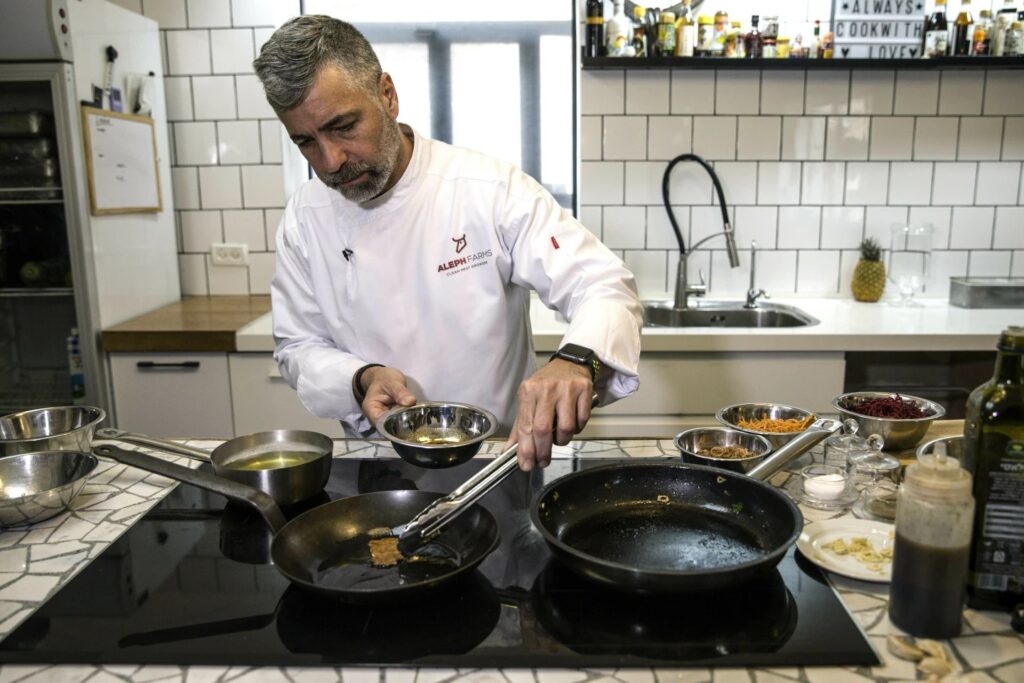An Israeli company has received a preliminary green light from health officials to sell the world’s first steaks made from cultivated beef cells, not the entire animal, officials said. The move follows approval of lab-grown chicken in the U.S. last year.
Aleph Farms, of Rehovot, Israel, was granted the initial go-ahead by the Israeli Health Ministry in December, the company said in a news release. The move was announced late Wednesday by Israeli Prime Minister Benjamin Netanyahu, who called the development “a global breakthrough.”
The firm said it planned to introduce a cultivated “petite steak” to diners in Israel. The beef will be grown from cells derived from a fertilized egg from a Black Angus cow named Lucy living on a California farm.
Regulators must still approve the company’s labels and conduct a final inspection, said Yoav Reisler, of Aleph Farms. After that, it could take months before the product is served to diners.
Aleph Farms joins Upside Foods and Good Meat, two California-based firms that got the go-ahead to sell cultivated chicken in the U.S. in June. More than 150 companies in the world are pursuing the goal of creating cultivated, or “cell-cultured,” meat, also known as lab-grown meat.
Proponents say that creating meat from cells will drastically reduce harm to animals and avoid the environmental impacts of of conventional meat production. But the industry faces obstacles that include high costs and the challenge of producing enough meat at a large enough scale to make production affordable and profitable.
Cultivated meat is grown in large steel tanks using cells that come from a living animal, a fertilized egg or a special bank of stored cells. The original cells are combined with special nutrients to help them grow into masses or sheets of meat that are shaped into familiar foods such as cutlets or steaks.
(AP)












6 Responses
I’m not certain but this may still be considered aever min ha’chai if the fertilized egg is removed from a living animal. If the cow was first schechted then at least it would be considered ben pakua.
Anyone know of the kashrut implications of this..?
No, it is NOT eiver min hachai. One cell was removed from a living cow’s fertilized egg. One cell that is not even visible to the naked eye, so it has no metzius. It is certainly not an eiver. But even if it were visible, you are not eating that cell. You are eating cells that were grown from cells that were grown from cells that were grown from cells […] that were grown from that cell. They have no connection to the living cow. And once a culture is three generations removed from the original sample it is considered by halacha to have nothing of the original sample in it. Any commercial product is going to be far more than three generations removed from the original cell, so there is no problem.
Halachically this would not have the status of meat, or even of a plant. The closest analogy in nature would be a fungus. So it would be parev and shehakol.
Not a Posek here, but IIRC, the concensus of Poskim is that it is Kosher and Pareve.
The Poskim may rule it is Kosher Basari or Kosher Parve, that does not mean it will receive approval from the Kashrut Agencies. It depends on how it’s marketed. “Impossible Pork” which is a 100% vegetable based product, did not get a hechsher from the OU because it of its name. There is also the Mar’it-ayin factor.
Mobico
I can not imagine that poskim will label a product that is meat, pareve
Even if by strict halacha it is, there is no way they will allow that
The potential issues in kashrut are vast
Gezeros have been made for far less